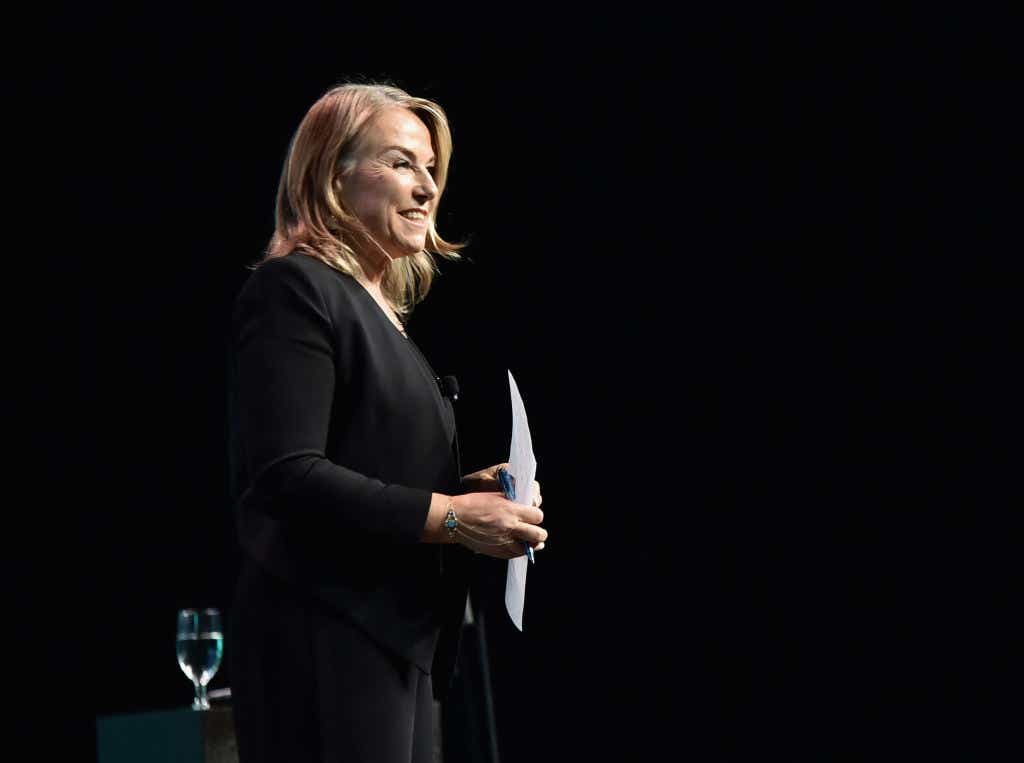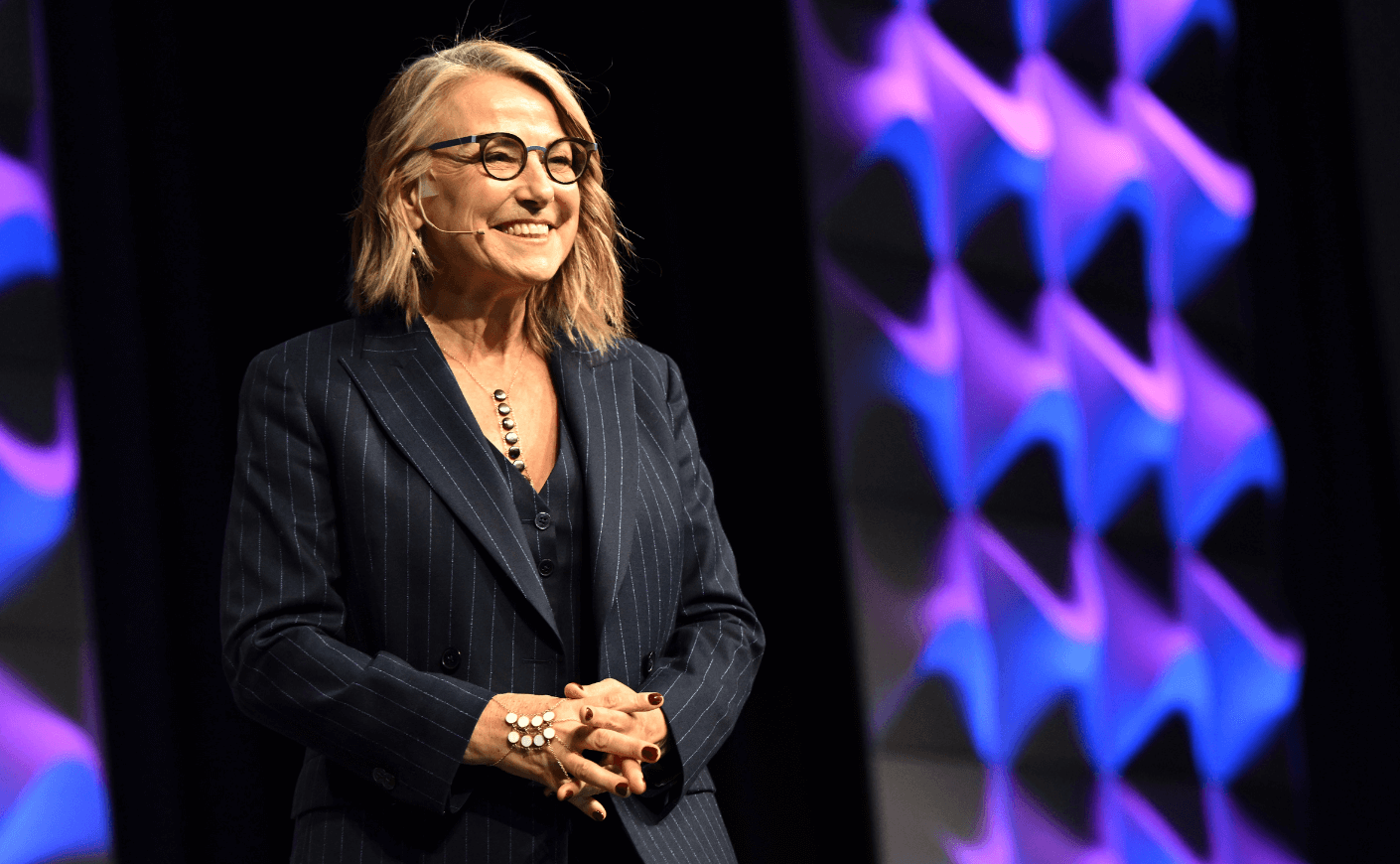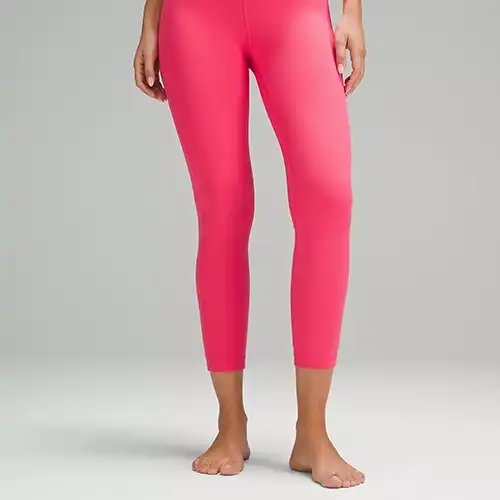Plus, her thoughts on the importance of friendship and why there’s a current “sexual recession.”
With her distinctive voice, discerning insight on the complexity of relationships, and ability to make you feel like you’re right there in the room with her, it’s only fitting that world-renowned psychotherapist Esther Perel is inviting people to do just that. This April, the New York Times best-selling author, podcaster and preeminent expert on how and why we connect the way we do, is inviting you into the fold with her inaugural American tour. It’s part cathartic group therapy, part workshop, and part focus group in order to figure out, collectively, how we can move through what life throws our way.
Ahead of the kickoff, I got to lay on Perel’s proverbial couch and ask some burning questions of my own, away from the eyes of 3,000 people. Turns out, it was a great place to begin.
*This piece was originally published on FashionWeekDaily and is reprinted here with permission.
Your very popular podcast franchise is called Where Should We Begin — so, how do you begin your day to set yourself up for success?
I start by having coffee with my husband. That can be short or longer depending on what we have coming, and then many times afterwards, I have phone calls with friends abroad. They know that they can reach me at that time before the day starts, so that’s often when I’m connecting with friends outside of the US. At 8AM, four times a week I meet with a group of friends to practice yoga. We have done that since the pandemic, since March 2020, so it’s exactly four years without missing a single day. That starts with a little catch up, seeing what’s going on with each of us and in the world, and then we practice for an hour before we say goodbye.
What time do you wake up?
Around 7. I start by connecting with my personal life, my social life, and my community, before I do what I need to do in my work life.
Tell us about the premise of your upcoming tour. You’ve referred to it as a huge first date with an audience of 3,000. What environment do you hope to create, and what do you want people to leave feeling like?
I do imagine it as kind of a first date — with 3,000 people. But the idea is really [about] real life. Why a tour? Because I want people to have an experience about relationships that is actually happening in the moment, as well. That we’re not just talking about connecting, we’re actually creating new connections. We come together because a lot of the questions at this point about relationships don’t have easy answers and there isn’t a one size fits all [solution]. But what we do know is that when we think about it together, in a community, we often get a better stab at it. And a lot of the times we find ourselves alone, confronted by these big questions of sex, love, desire, heartbreak, jealousy, betrayal, and the like. A lot of it is that these are not aspects of life that we should be experiencing alone. [These issues] are actually shared by a lot of people, who each go through their own experiences. I think that, in some ways, the real show [happens] after you leave. Maybe when you have a second date. For people who are coming solo, or with partners, that are seeking relationships, or are too afraid to even contemplate it. I want this experience to happen in the moment: It’s so valuable that the need to document it is not superseding the event itself. Sometimes, these days, you go out to eat and you take pictures of the food before you’ve even eaten because the performance around the food is more important than the meal itself. I would love to have a beautiful three course meal, in the moment, with the people in the audience.
I was listening to your podcast with Brené Brown this morning, and that concept of “AI” — as in “artificial intimacy” — really resonated. This idea that you have countless friends online but who do you go to in person? Was this an inspiration for the tour?
Absolutely. I spent two years during the pandemic lecturing and looking at a green dot on my screen, imagining people laughing or responding but not hearing a thing. It was so numbing. You could have a connection and technology helped us stay in touch, but it was disembodied. There’s something about breathing the same air together, when for so long that had become a danger. There’s something about feeling the heat radiating from the person, stranger, or partner that’s sitting next to you. There’s something about laughing in community or being moved together by the story of one person. That’s when I created the card game. We needed connection, fun, intimacy, and pleasure, and so how do we create that? I started with a game because it’s storytelling and I think of relationships as stories. And then one day I started writing books. I wrote what was happening in the office on a page. Then one day I started a podcast and I brought people into the office to listen into sessions with other couples or individuals. Then I went to the next level and I said, “Now I want to have that session, so to speak, collectively.” I want to have it in real life and with everyone, so that it becomes a co-created conversation and it’s not a talk where you just hear me. It’s actually a conversation we create together. Sometimes the best sessions are when you don’t know where to start. Sometimes people come in and don’t know what to talk about that day, and those kind of take you on an adventure. And that adventure is what the show is going to be.

A lot of people are familiar with you “one-on-one”; listening to you on podcasts, privately, while they go about their day. With this live format, will it feel like it’s intimate and one small room with 3,000 people, or is it more unpredictable than that?
It’s both of these things. On the one hand, it’s an intimate experience with thousands of people, but you have the feeling that some of the things are addressing you. One moment you’re looking inside, one moment you’re looking around you. One moment you’re exploring what is your own, the next moment you’re connecting with others and their own. That’s one piece, and the second one is that it’s an interactive, immersive experience that’s not scripted. The beginning has a small presentation where share some thinking together to lay the ground of what we’re going to talk about, but the second part is all improvised.
I love to read the transcripts of the calls that you do with people for The Cut, because I think it opens our eyes to issues that we might not have, but still resonate in other ways. Will you have the tour turned into podcasts, or is it more like, “What happens in the room stays in the room…”
The tour is not being recorded for a podcast. This is it, it’s in the moment: it’s ephemeral, it exists for what it was, and if you’re not there, it’s the party that you missed because the next day it will be a different party. The idea is really to have different experiences each evening. If you come to one city and then to another, it’s not necessarily going to be the same. I have other formats for the podcast: we have Esther Calling, where people from all over the world can send in recorded questions that they have and we call them by surprise and have an hour-long individual session. And then we have Gut Check, where I give sessions to colleagues and ask them how they would have done the same session so I can see how other therapists address this very same issue. I think one of the things that’s important to understand about the tour is that we are going to talk about love and desire and sex, but we’re not just talking about it within the immediate association of romantic love. There is intimacy in friendships, sexuality outside of romantic relationships, and there is desire in multiple situations, so it’s really to broaden the framework. That’s part of the conversation as well.
I’ve seen you say that we’ve never expected more from our intimate relationships. What do you think is the bare minimum that we deserve?
Maybe ask first, “Why is it that we expect so much from our intimate relationships?” What has happened as the importance of religion has waned and the importance of communal structures has waned, is that we have transported and transferred some of our existential needs into our relationships and into our workplace life. It’s that. And what are those existential needs? It’s the need for belonging, the need for identity, the need for community, and the need for meaning. These things did not necessarily belong in the realm of romantic love or marriage. So that’s why we have come to expect so much from our intimate relationships. We used to want a partner, a companion, and economic support. Then we wanted a best friend and a trusted confidante and a lover. And now we really have an identity project: “I want you to help me become the best version of myself.”
What is the minimum we deserve? We deserve to have a sense of community, to know where we belong, to feel part of something. We deserve to know who we are, and how does it connect to our past; our communal past, our ancestral past? What is the group that I belong to? A sense of community that cares about me, and a sense of meaning that helps me transcend my existential loneliness. And so that’s the bare minimum. Now, for some people, the bare minimum is a deep sense of belonging: I am safe, I am loved, and I am taken care of. I don’t need sex, excitement, or desire — all of that is too chaotic for me. For others, I need security and safety and predictability, but I also want change, adventure, and risk. It’s that, straddling with the other fundamental human needs, like security and freedom.
Everyone negotiates in their relationships today, so it’s not so much the minimum you deserve. You deserve dignity, respect, safety, care, basics — I think we live with more than just what we deserve. So there is what we deserve, and then there is what we allow ourselves to want, and then there is where we sometimes want too much, but that’s on the far end of the other side.
Do you think it’s this idea of AI — artificial intimacy — or dating app culture or comparisons on social media that have exasperated this? Or is it just humanity evolving?
We expect more for a multitude of reasons. We expect more because, for the first time in history, we actually expect to be happy! Happiness has always belonged to the afterlife. Sometimes, it was a possibility or a moment, but it wasn’t a mandate for life. We expect more because we live in a culture that constantly demands you to maximize and optimize everything and to forgo the good for what is perfect. Those are the bigger things; some kind of consumer mentality that you can always get more, that you have a thousand choices at your fingertips. All of that is contributing to wanting more and to being frustrated, and then to question yourself personally. What’s wrong with me that I haven’t gotten it? You never question the model, you question the person.
How do we identify what’s a priority for each of us, then? Is there a way to do that?
It’s maturity. It’s life, it’s growing up. You start out with the things that you were told are important. I just did a shoot and I asked the photographer, “Where did you grow up? When did you know that photography would be your thing? When did you know you were going to leave the small town where you grew up? At what age? When did you know your life was going to be different from the one you were raised in?” And he said, “I had a good education, but I didn’t know the world. The world beckoned me.” So how we find out what matters is a matter of trial and error, a matter of the teachers we come across in our life. It’s a combination of chance and choice. Coincidence, things you didn’t expect, and things you were looking for. It’s a magic.
Very few people know very early on what they want, what they’re good at, what they want to pursue. For the majority of people, it’s a combination between their competence, their talent, and the opportunities that life puts in front of them. Comparison is the thief of joy. If you go and start to think your self-esteem is measured by the amount of likes that you get, you are extremely vulnerable. It puts you completely at the mercy of what others think about you. Whereas a good sense of self is always what you think about you, in contrast with what others think about you. But if you only think about you and not others, you have an issue. And if you are too much at the mercy of others and you don’t have an inner anchor of your own, you also have an issue.

I think me and most every person my age who’s single in a big metropolitan city like New York feels is that there’s this fatigue with dating and swiping. How do you reframe your perspective to feel that it’s possible to meet someone when this is just the point we are at now with modern dating, and how do you foster your own personal optimism and ability to keep going, if you will?
How old are you, if I may ask?
I’m thirty two.
So you are at the tired end. I mean, my heart goes out. Let me say two things on the app and two things on the dating, because these two things need to be separated. The dating apps broaden your reach, no doubt. Especially if you are part of minority communities, you get to be connected with people like you, especially when you live in places where there are very few. At the same time, the apps often do not ask you questions that help you get to the heart of who a person is. And the thousands of people at your fingertips that you swipe through leads you to constantly be evaluating yourself. That evaluation leaves you feeling like you are not good enough, or that others are not good enough. So there is a complete commodification and that commodification is so crushing. On the other end, there is the dating. Dating, at this point, takes place away from your life. “I have a date tonight” means that I won’t be seeing my friends. And I have to decide how many hours I’m willing to give to that, when in fact, I could have a much nicer time with my friends than going on a boring date — which is often a conversation in a noisy place that resembles a job interview.
So, to which I say, if you are going on a date, integrate it into your life. Don’t leave your life to go date, and then feel like there is a hole that is being created. If you meet somebody and you are going tomorrow to see a movie or show, going hiking, biking, golfing, bowling, to a museum, you name it, then [the date] needs to be organized around an activity. It gives you something else to talk about, rather than probing questions that are meant to see if [the person] is going to suddenly turn you on or give you butterflies in your stomach. It’s crazy, it doesn’t work like this. So, you integrate the people, you bring them along with your friends instead of the opposite; where I date you and when it’s finally serious, then I introduce you to friends and do the big reveal. If it doesn’t work, it doesn’t work. But you also get so much more information from a person from bringing them into your world and seeing how they interact with those around them.
And so [my advice is] a) do something in movement and don’t sit and look at each other around a table and ask questions; do something you enjoy so that at least you are engaged with the activity itself and do it with the people that are in your life so that you are integrating dating rather than the dating taking you away from your life into this, often, very empty space. And that said, b) you can continue to use the apps, but meet as soon as you can and don’t forget to still talk to people in the street, and actively create a social circle with your friends with old and new friends coming together. I think that what is getting lost is the serendipity and happenstance and just meeting like that.
I guess it limits how much expectation you’re putting on one person too, because, like you said, we expect so much from everyone now.
Yes and even then it becomes less of a “make or break” or a “yay or nay” [scenario]. What do you think of what I’m suggesting here?
I think it’s a great idea, because we’re at the expense of big businesses that have game-ified dating. The intent is that we should constantly feel like it’s an endless cycle of people, that we should stay on these apps, and I think it’s really given people a false sense of what is possible, and expecting the world from each tiny interaction.
Do you think it’s worse for the girls than the boys?
Worse to be on the receiving end of it?
The whole experience.
I think it is worse for girls, unfortunately, because the traditions of waiting around do still kind of ring true. My two cents is that, in a city like New York, there is an incredible array of women who have everything going for them, so the men are almost in a candy shop. And I feel like I’ve dated for a long time to back that assumption up…
Where did you grow up?
I’m Irish, so I didn’t grow up around males where it felt like they were playing so many games. And that actually brings me to my next question: Your seminal essay from 2006, “Of Sex & Marriage,” was from the perspective of someone European and looking at Americans’ attitudes towards sex and eroticism. Do you think that dating app culture and social media have changed the way that young Americans feel about sex and eroticism?
I think that, yes, but I don’t know that it’s just Americans. I think that dating culture, in that sense, is quite Western and I don’t think that if I was in Ireland I would hear a very different description than the one you just gave me. There is, maybe, a little bit more tradition left, where you sit in a bar and talk to the people next to you and not have everybody looking at their phones and avoiding eye contact. I think what is changing is not so much the attitude towards sex. What changed is that we’ve come out of the pandemic and now we have an increased digitization of our life and an increased contactless world and we are more socially atrophied. That social atrophy then translates into people staying more at home and they don’t need to leave to get food nor to work nor to exercise nor, in some way, to have sex. In that sense there is a shift going on. Growing isolation, less skills for social connection, and a sexual recession.
When you say sexual recession..?
People are having less sex. For millennials, and especially Gen Z. They are having a lot less sex than Boomers did. Which is ironic. I mean partnered sex, not solo sex, for which they don’t need to leave their apartment either.

Where do we go from here? Is it to try meet more people in person? Is it to increase chance and fate by broadening your circle?
I think it’s about involving your community, first of all. It’s about referring, sharing, saying, “I know a few friends from college, but they might not know of [each other] so I would love to introduce them.” If you dated someone who wasn’t right for you, maybe they would be for someone else. It’s really interesting how little people bring their friends together. I’m not even talking about potential romantic partners. Just simply bringing friends together. In groups, everything feels different: if you talk to two girlfriends who have had the same shitty experience, it’s different than when you’re alone coming back home from a shitty date or a boring date and then going on social media and thinking that other people are having a wonderful time in life. This is really doing a number on us. It’s about meeting, bringing new people into the circle, and letting things unfold. It’s about doing things that are fun, so at least you’re not putting yourself on hold to go shop for a mate.
It is that cliché advice that’s maddening when you are single, that you’ll “meet someone when you least expect it,” but there is a degree of that: to take the pressure off and to look elsewhere.
That’s right, and you take the pressure off when you live your life to be really rich. What starts to happen is that you get so tired shopping for a mate that [you act like your] friends are just fillers. Friends are an absolute source of love and sustainability and support that may outlast any partner you will ever have.
I love the idea that friends are your life’s real great loves, especially at this point, while you wait for something else you can get your life partnership with them…
It’s not even while you wait. It’s that they’re an absolute luscious meal. They are nurturing, they feed you, and they will be around. Life you can bring a partner, but you will not run the risk of asking one person to give you too much because you will be sustained by a group of other people. We need to diversify our needs, spreading it out through a group of people around us.
How you start your day is such a nice example of that: coffee with your partner, then doing something that gives you physical joy with your friends, before everyone else comes to you and needs something from you.
Almost all my physical activity is done socially. I integrate my physical activity into my social life so it doesn’t wait while I take care of other things.
Reprinted with permission from FashionWeekDaily. Tickets to Esther Perel’s national tour, with events this April in NYC, Philadelphia, Boston, DC, LA, Seattle, and San Francisco, are now available.













